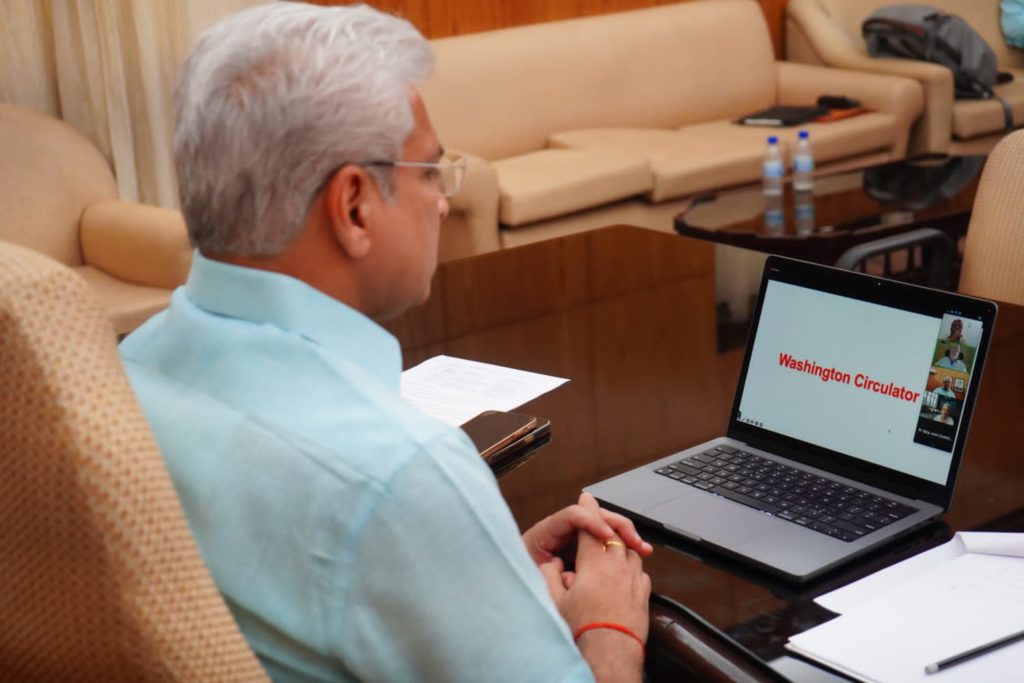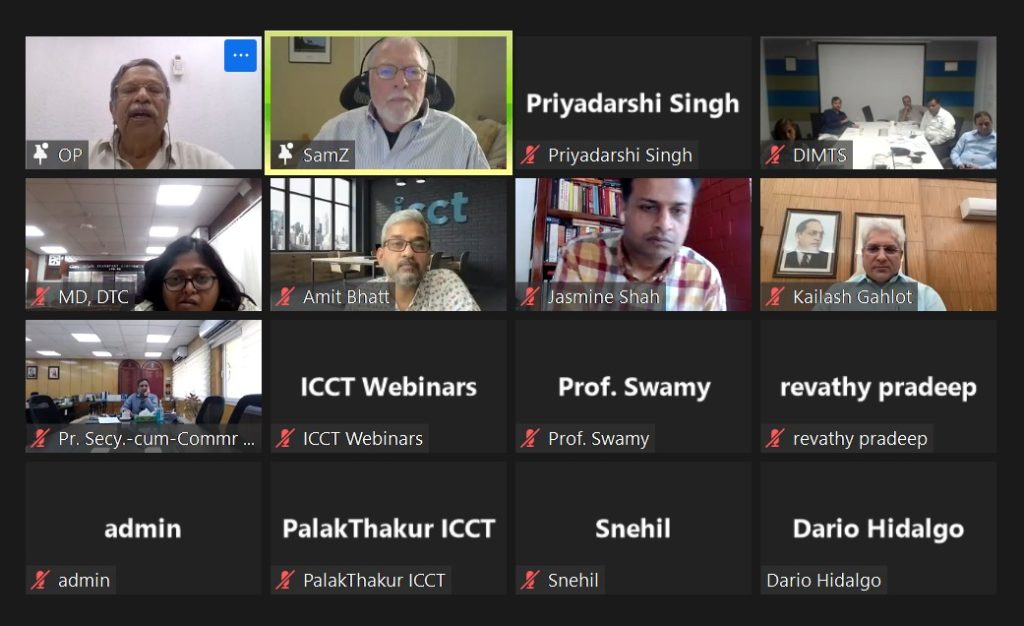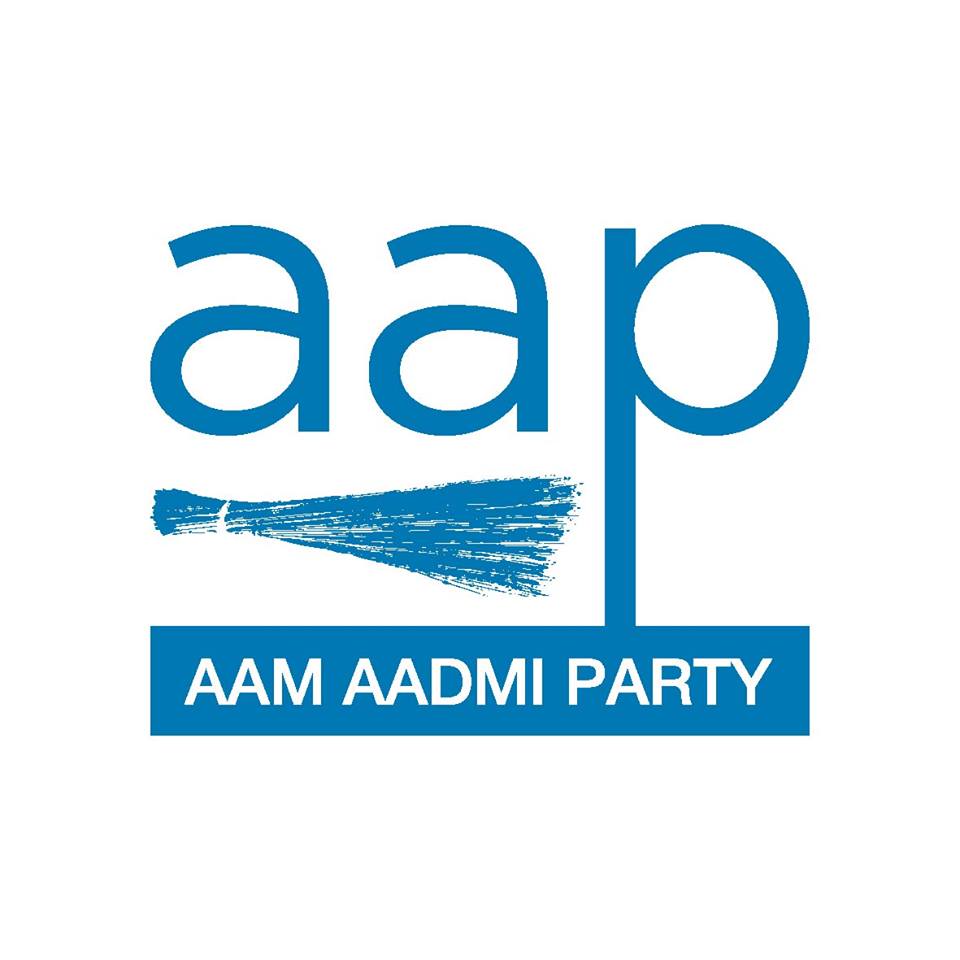The Kejriwal Government is poised to revolutionize the city’s public transportation system by introducing small-size electric Mohalla buses on the city’s roads. The move is aimed at improving transportation access for people living in areas where the width of the road is less or where regular 12-meter buses cannot ply due to overcrowding. The Mohalla Bus Scheme was announced earlier this year. The scheme aims to deploy 9-meter-long electric buses to provide a neighbourhood or feeder bus service. The Kejriwal Government plans to roll out a total of 2,180 such buses by 2025.

To develop the framework for the Mohalla Bus scheme, Transport Minister Shri Kailash Gahlot chaired an international experts consultation today. The virtual consultation was attended by Transport Commissioner Shri Ashish Kundra, Delhi Transport Corporation (DTC) Managing Director Ms. Shilpa Shinde, officials from DTC and Delhi Integrated Multi-Modal Transit System (DIMTS) and public transportation experts from India, Colombia and the USA. All the global experts welcomed the Delhi Government’s initiative under the leadership of Shri Arvind Kejriwal of Mohalla bus scheme and deemed it to be a game changer for increasing public transport ridership by solving the last-mile connectivity problem. The experts gave recommendations on different aspects of the Mohalla bus scheme, such as service design, average route lengths, fare design, fare integration, branding etc, while drawing on case studies or projects they have worked on from around the globe.
Addressing the meeting, Transport Minister Shri Kailash Gahlot said, “The route rationalisation study conducted by the Delhi Government, which understood the needs and demands of public transport users, has laid the path for introducing the Mohalla buses in Delhi. These buses will operate on shorter distances in Delhi, connecting important points of interest, including transport hubs like metro stations, within neighborhoods across. Under the able leadership of Chief Minister Shri Arvind Kejriwal, the Delhi Government is committed to providing world-class public transport to its citizens. With the introduction of Mohalla buses and the integration of different transport modes, we aim to make Delhi one of the top 10 cities in the world for public transport. We are also taking steps to ensure hassle-free operations, including finding new spaces to house the electric buses and electrifying the bus depots. In the coming years, we plan to integrate different transport modes into a reliable, affordable, convenient, and high-frequency multi-modal transport system.”
Today’s expert consultation was organised by the International Council of Clean Transport (ICCT). Addressing the gathering, ICCT Managing Director for India Shri Amit Bhatt said, “Without a doubt, buses are the backbone of any public transportation system, offering a level of flexibility that other systems like rail cannot match. However, for many years, cities have failed to harness this unique advantage to improve bus operations. The launch of Delhi’s Mohalla Bus service marks a potential game-changer in the way we view the role of buses in a city’s overall development and progress. By leveraging the flexibility of buses and tailoring services to meet the needs of local communities, this initiative has the potential to revolutionize public transportation in Delhi and beyond.”
Some of the experts who attended the consultation included Sam Zimmerman from the World Bank, who has worked on the DC circulator service; Prof Shivanand Swamy from Centre of Excellence at Urban Transport; Dr. Dario Hidalgo, Professor at Javeriana University in Bogota, who has worked on feeder service for a number of cities in Colombia; and Dr. OP Agarwal, Senior Fellow at Niti Aayog, who proposed the Dwarka circulator service.
During the discussion, Ms. Revathy Pradeep from ICCT presented a concept for the Delhi secretariat shuttle bus service, which can act as first or last-mile connectivity for the government employees to the nearest 3 Metro lines, besides also providing connectivity with Rajghat and MCD Civic Center.
Dr. OP Aggarwal, Senior Fellow at Niti Aayog, welcomed the Mohalla bus service and suggested that it should meet multiple local needs. It should not be confused with a mere Metro feeder service. Instead, it should be looked at as a service connecting multiple points of interest within a small area like malls, shopping complexes, employment hubs etc. While affordability is one of the factors, he emphasized that for shifting a major chunk of people to public transport, certain hygiene parameters like reliability, less crowding and cleanliness are also very important.
Dr. Sam Zimmerman from the World Bank discussed the popular ‘DC Circulator’ bus services being run in Washington DC since 2019 exactly on the pattern of Mohalla bus services. He emphasized how differentiation in colours was created for the convenience of bus users and said that ‘pervasive branding’ of all elements is critical. He further suggested making the vehicle identifiable and ensuring simpler and shorter routes with very high-frequency services so that people don’t have to wait. Showcasing how the DC Circulator buses started as free initially and are now run on a fixed $1 fare, he emphasised that the Mohalla bus service also should have a simple fixed fare, with free transfers from the existing public transport system if possible.
Dr. Dario Hidalgo, Professor from Javeriana University in Bogota, discussed the success of feeder services operated in various cities in Europe and Latin America, particularly Colombia and Brazil, and held them to be essential to the success of the overall public transport system. Drawing lessons from decades of experience with similar bus services from around the world, he suggested that the Mohalla bus service needs to have short station spacing and higher frequency to reduce walking distance and waiting time for commuters. He also recommended the overall travel time on these routes be kept under 30 mins.

Prof Shivanand Swamy, Professor Emeritus, CEPT, welcomed the introduction of the Mohalla bus service in Delhi and shared his experiences from designing the bus services in Surat and Ahmedabad, including the Savaar-E feeder service, a fixed route rickshaw service that connects various activity centres in Ahmedabad.
The Mohalla Bus Scheme is an initiative to provide affordable and convenient public transportation to residents of all localities, especially those living on the outskirts of the city. Small and medium-sized buses will ply on designated routes, covering all neighbourhoods and localities, especially poorly connected residential as well as commercial hubs. The buses will be equipped with modern amenities and will operate on a frequent and regular basis. The Mohalla Bus Scheme is part of the Delhi government’s commitment to providing accessible and efficient public transportation to all citizens.

